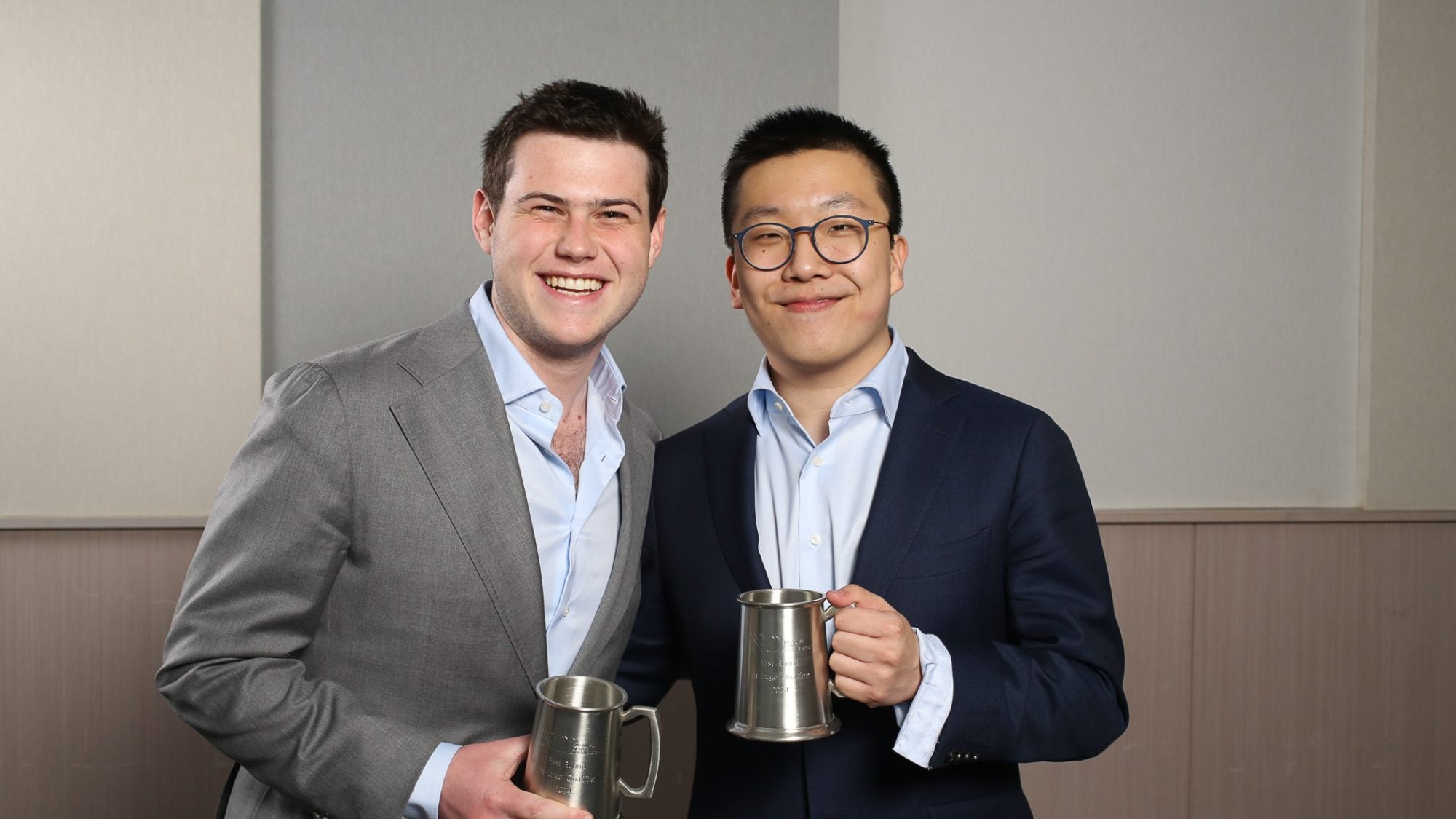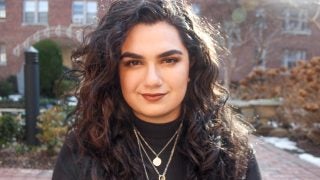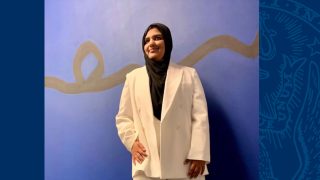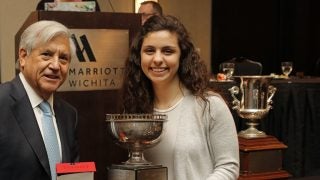As their last year at Georgetown wound down, Zidao Wang (C’24) and Kieran Lawless (SFS’24) had one important test to pass.
The National Debate Tournament, the March Madness of college debate. Every year, around 150 of the most elite college debaters put their oratorical skills to the test for a chance at becoming the No. 1 team in the country. Since Georgetown’s debate team began in 1830, Hoyas have won the tournament four times and clinched the Top Speaker Award six times.
Wang and Lawless’ chances were promising. The debate partners ranked fourth in the country coming into the tournament. They had been preparing since May of last year, combing through thousands of research papers on nuclear weapons, the debate topic that year. In the weeks leading up to the tournament, they spent 10-12 hours a day in Georgetown’s debate office, covering whiteboards with strategies. They’d even debate each other in their free time.
“I think we had at one point argued about which person’s thumb was bigger. That happened,” said Wang.
Their personal stakes were also high. They had both dedicated all eight years of their high school and college years to debate, spending summers at debate camp and weekends traveling to tournaments, even skipping all their spring breaks to prep.
“It’s the conclusion of eight years of both of our lives,” Lawless said. “So there’s nothing left to do but give it your all. I’m excited to see what we get done.”
A Friendship Forged in Debate
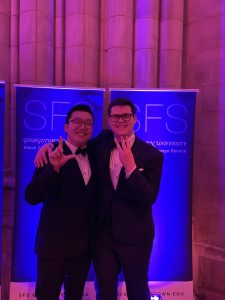
The 2024 National Debate Tournament would also be their last as debate partners.
Lawless and Zidao met in high school at a summer debate camp in Michigan (Wang won their debate junior year; Lawless their senior year). They were both drawn to Georgetown for its 194-year-old debate program.
“I really liked how well debate would teach you about any given topic. I was excited to keep that going,” Lawless said. “I was also intrigued by Georgetown, [which] is very well-known in the high school community for its collegiate debate success.”
Their first year at Georgetown, the COVID-19 pandemic hit, and Zidao and Lawless found themselves debating virtually from their childhood bedrooms. “I would basically retreat into my room for three days and emerge after,” Lawless said of attending tournaments online.
They also found the debate team created a mini community at Georgetown, with upperclassmen offering guidance on which restaurants to try or classes to take — the latter of which helped deepen their knowledge in the debate room.
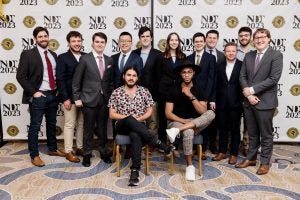
Throughout their Georgetown careers, Zidao and Lawless often chose classes that focused on the debate topic that year and bounced ideas off professors like Dennis Wilder, who had served as the National Security Council’s director for China and the senior editor of the President’s Daily Brief, a worldwide intelligence update.
“I think it’s mutually reinforcing in the sense that both what you learn in your classes, not just international relations but economics classes, even writing classes, can help make your debate speeches better,” Wang said. “But also, at the same time, what you learn in debate often helps you in your classes.”
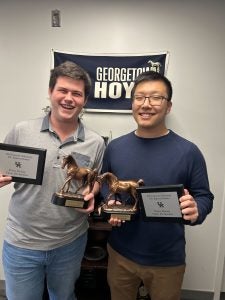
Along the way, Zidao and Wang became friends, trading ideas and debating each other. Their junior year, they decided to join forces as debate partners. Their debate coaches also saw the value of this partnership.
“Zidao is very reflexive and good at adapting to new arguments on the fly whereas Kieran has a great strategic mind and is capable of producing well-thought-out and innovative strategies,” said Gabriel Lewis, assistant director of debate at Georgetown. “Their strengths and weaknesses balanced each other out very well.”
They found their friendship suited them well in the debate arena.
“There is a running joke in the debate community that we hate each other, which is funny because we literally lived together,” Lawless said. “We’re best friends at Georgetown, but we also just disagree very strongly sometimes in rounds.”
The Last Debate
The night before the first day of the National Debate Tournament, Wang tried to get to sleep early. He thought about how this would be his last tournament ever.
“I know that if we lose in the elimination rounds, we won’t debate again,” he said. “But we have to have that mindset of we’re here to beat people. We’re here to win. We’re ready to go.”
They won their first day, beating Wayne State University, University of Southern California and Minnesota.
After two losses the second day to Texas and Michigan State, they ended the day with a win against Baylor University.
The third day, they beat Gonzaga University and lost to Emory. The duo advanced to the elimination rounds, the National Debate Tournament’s equivalent of the NCAA tournament – and they weren’t alone, two other Hoya teams joined them, a first in Georgetown history.
After beating Macalester University, Lawless and Wang made it to the Sweet Sixteen.
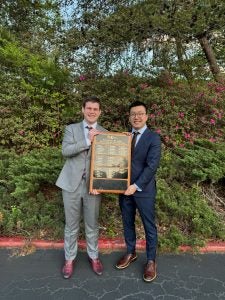
They ultimately lost to the University of Michigan, which won the entire tournament. While Lawless and Wang were disappointed, they felt like their hard work and preparation was still worth it. So did their coach.
“The five judges on the panel were emotional when discussing how much they’ve enjoyed judging Kieran and Zidao over the past four years. It was very special to witness how much of an impact both Kieran and Zidao made on the debate community,” he said. “I could not be more proud of Kieran, Zidao and the rest of our team.”
Wang and Lawless ended the season ranked fourth in the nation. They were also awarded top speaker awards at the tournament, ranking sixth and seventh respectively.
They said they’ve both found that debate will prepare them well for their future careers, particularly in job interviews: They both plan to eventually attend law school.
And their debate careers won’t be entirely over. They plan to advise Georgetown’s debate team, helping the next generation of Hoyas top the charts. And one more thing.
“We’ll still debate each other,” Wang said. “It’s kind of a habit.”
